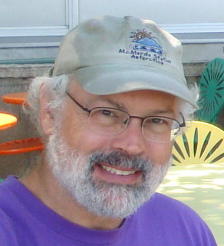Alan Robock

Alan Robock is a Distinguished Professor of climate science in the Department of Environmental Sciences at Rutgers University. He graduated from the University of Wisconsin, Madison, in 1970 with a B.A. in Meteorology, and from the Massachusetts Institute of Technology with an S.M. in 1974 and Ph.D. in 1977, both in Meteorology. Alan was tear-gassed three of his four years in Madison trying to stop the Vietnam War. He lived on the 500 block of Mifflin Street for his last two years in Madison, and was there for the first Mifflin Street Block Party. Before graduate school, he served as a Peace Corps Volunteer in the Philippines.
He was a professor at the University of Maryland, 1977-1997, and the State Climatologist of Maryland, 1991-1997, before coming to Rutgers. Prof. Robock has published more than 400 articles on his research in the area of climate change, including 250 peer-reviewed papers. His areas of expertise include geoengineering, climatic effects of nuclear war, effects of volcanic eruptions on climate, and soil moisture. He serves as Associate Editor of Reviews of Geophysics, the most highly-cited journal in the Earth Sciences. His honors include being a Fellow of the American Geophysical Union, the American Meteorological Society (AMS), and the American Association for the Advancement of Science, and a recipient of the AMS Jule Charney Award. He recently served as a member of the Board of Trustees of the University Corporation for Atmospheric Research, which operates the National Center for Atmospheric Research. Prof. Robock was a Lead Author of the 2013 Working Group 1 Fifth Assessment Report of the Intergovernmental Panel on Climate Change (awarded the Nobel Peace Prize in 2007). In 2017 the International Campaign to Abolish Nuclear Weapons was awarded the Nobel Peace Prize for “for its work to draw attention to the catastrophic humanitarian consequences of any use of nuclear weapons and for its groundbreaking efforts to achieve a treaty-based prohibition of such weapons” based on the work of Prof. Robock.
